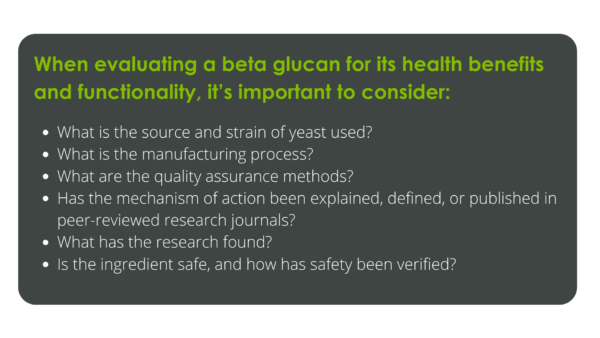Why is Science Key to Immune Health Product Success?

Interest in immune health as an essential component of overall wellness continues to grow, with as many as eight in ten (77%) consumers indicating that they will make greater attempts to stay healthier in the future. At the same time, consumers face an increasingly wider variety of product choices, as launches of food and drink products with immune health benefits increased by 12.9% in the year up to April 30, 2020 – up from 5.4% in the previous 12 months.
With so many available options, perhaps the biggest differentiator among products is the scientific backing for the ingredients that make up the functional benefits of the product. Simply, put, research supported immune health ingredients are critical for helping consumers choose products that meet their wellness goals.
Research supported ingredients simplify immune health choices.
In today’s crowded marketplace, clinical studies supporting an ingredient’s benefits and efficacy are a highly effective way to communicate product benefits. Consumers now make purchase decisions by seeking out scientific data supporting a product’s efficacy. In fact, recent global research from Kerry, the maker of Wellmune®, found that 39% of consumers would be more likely to buy a healthy lifestyle product with claims based on scientific data.

Although the market for healthy lifestyle products is vast, consumers say scientific claims influence product selection. Research builds credibility and transparency, and can help simplify customer choice.
What to look for in an ingredient.
Formulating with research backed immune health ingredients can help manufacturers build trust in the products they are creating and meet consumers’ need for transparency in product claims. Likewise, research-supported ingredients can differentiate immune health products in the marketplace, helping manufacturers create the best products to meet consumer demand.
But not all scientific research is the same. When evaluating an immune health ingredient for a future product, it’s important to focus on the quality of the research. Of course, the starting point is the study itself. How was it designed, and what were its outcomes? As well, considerations for the ingredient should include information on the ingredient’s:
- Safety and mechanism of action
- Serving size required to deliver benefits
- Measurement and standardization (characterization)
In addition to investigating an immune health ingredient’s overall effectiveness, manufacturers that want to add research-backed ingredients to their products will need to consider other fine points. For instance, different brands and blends of the same ingredient may be offered in different concentrations and, when the active ingredient is put through traditional processing, there could be nutrient losses that influence effectiveness.
Research distinguishes immune health ingredients.
Along with the surge in demand for immune health products is a flurry of new products with varying claims on how the product helps support immunity. While popular ingredients such as Zinc, Echinacea, and Vitamin C hold some promise, it’s important to note that not all ingredients have the same level of science supporting their efficacy. Importantly, research is a key ingredient behind quality immune heath products in a crowded market.
Although it’s true that some manufacturers have found success in formulating with blend of immune health ingredients to achieve a balance of consumer recognition and scientific support of health benefits, research on these ingredients continues to evolve. Research into the immune health benefits of Wellmune, a proprietary yeast beta glucan, highlights how its unique ingredients can help support immune health in people of all ages.
A report published in the Molecular Nutrition & Food Research Journal, indicates that supplementing with beta glucan can support the body’s natural defenses, rather than overstimulating them, which could have adverse effects. The review focuses on the mechanism of action of beta glucans as immunomodulators, exploring the theory that they may ‘train’ the body’s immune cells, triggering changes that help fight off pathogens. As noted in the report, this research is continually evolving as new studies are conducted to further confirm outcomes.
The paper also evaluates clinical trials on the benefits of supplementing with beta glucans. The best-studied beta glucan supplement ingredient, and the one that has demonstrated the best results, is Wellmune. This level of study represents an ever-deepening commitment to providing high quality research supported immune health ingredients.
In addition, a recent study published in peer-reviewed scientific journal Food Chemistry helps to illustrate that each source of yeast beta glucan has a unique chemical structure that influences the immune-supporting benefits offered.

Future-proofing immunity.
Clearly the future of immune health is quality research. As well, consumer demand for safe and clinically demonstrated immune health products is fueling growing interest in the benefits of yeast beta glucans like Wellmune. As consumer knowledge grows, the importance of clinical evidence is only likely to increase. The key to success lies in formulating with research supported immune health ingredients to create products that are a good fit for a variety of consumer demographics and lifestyles, including children, older adults, people experiencing lifestyle stress and both competitive and casual athletes.
Learn more about formulation opportunities with research supported immune health ingredients that can help meet the demand for immune health products.
Sources:
Kerry Global Consumer Survey, 2019
FMCG Gurus – Evaluating the Uncertainty and Future Outlook of COVID-19

